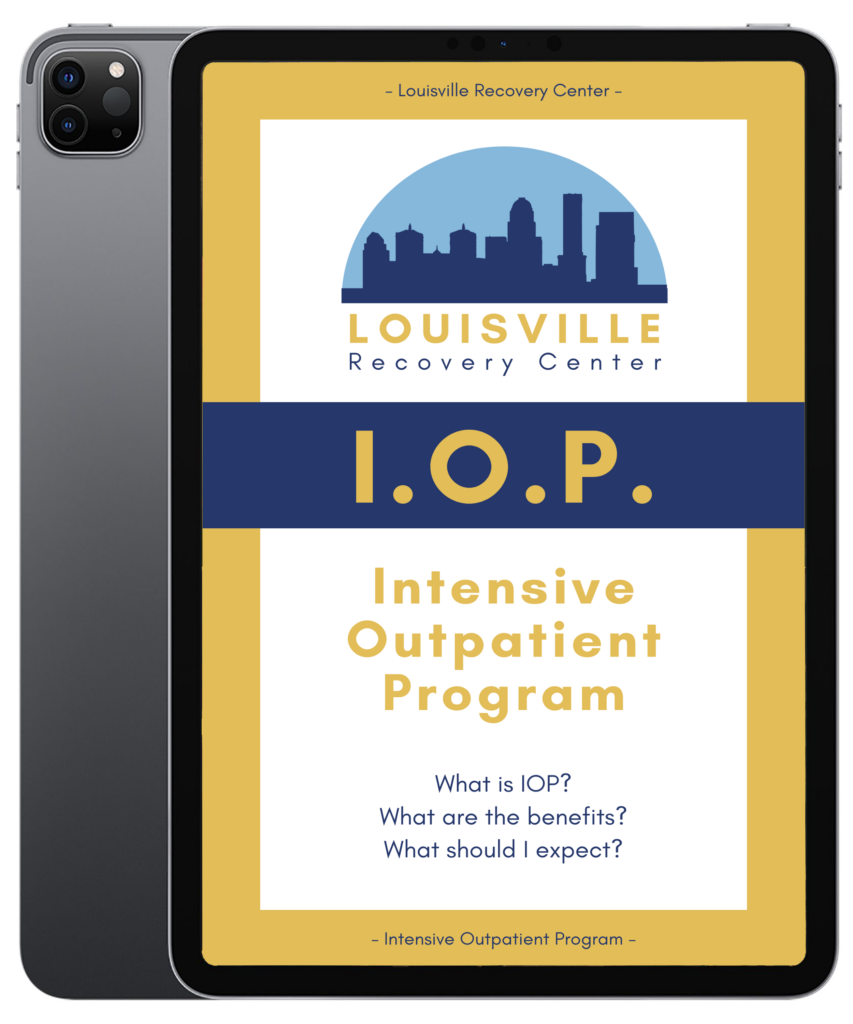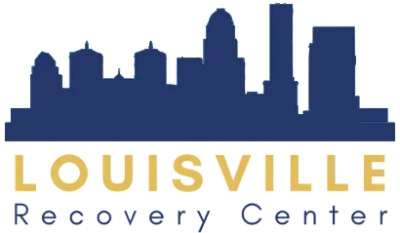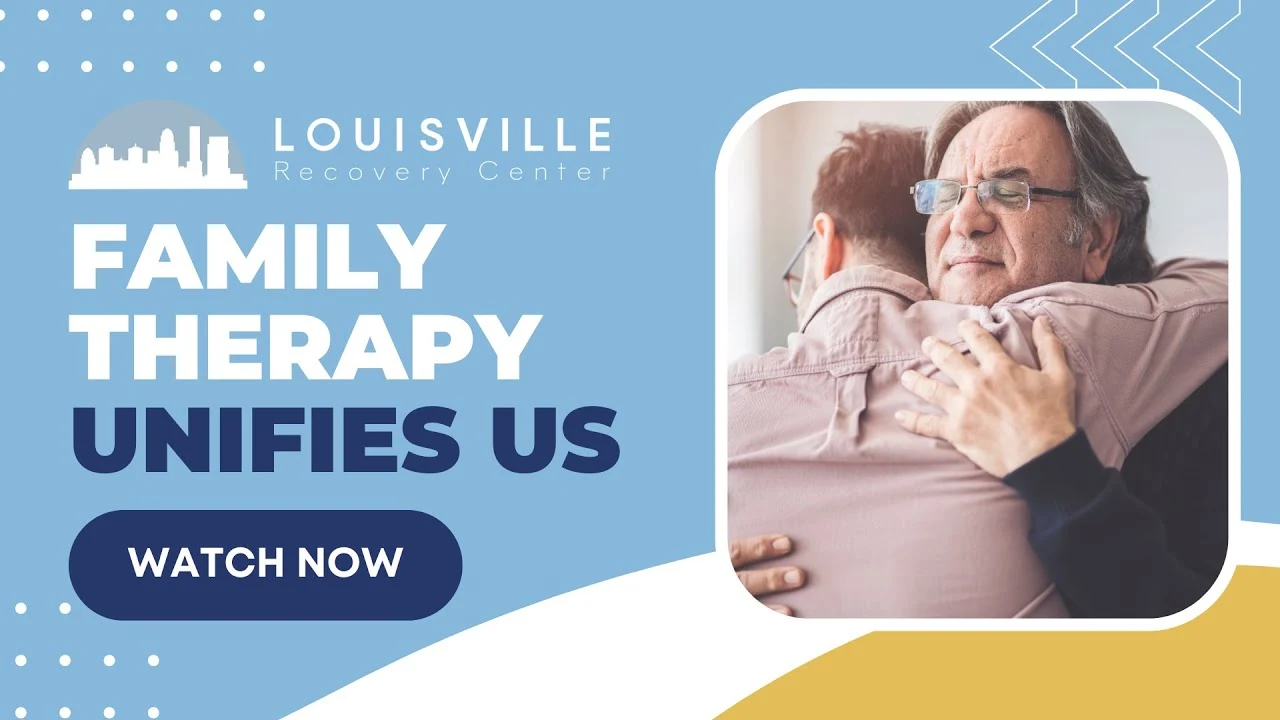Family Therapy In Louisville
at Louisville Recovery Center
When an individual struggles with addiction and seeks help from a mental health professional, a healthcare provider, or an addiction treatment center, it typically indicates that the substance abuse issue has progressed to a serious stage. A substance abuse problem in a loved one’s life can have a major impact on not just the user, but their friends and family members.
At Louisville Recovery Center, we are committed to providing treatment services to individuals with drug or alcohol addiction as well as their entire family and all its members—spouses, parents, caregivers, siblings, children, or other relatives. If you’re concerned about a relative’s substance abuse, we can help you.

Fill Out This Quick Form To Download Our FREE IOP eBook
What is Family Therapy?
Family therapy, as defined by the American Psychological Association (APA), is a type of psychotherapy that focuses on improving family relationships and behavioral patterns among the family as a whole, as well as among individual and subfamily groups or subsystems. Family therapy is utilized in drug and alcohol treatment centers in order to help those struggling with addiction live drug-free and alcohol-free by drawing on the family’s resources and strengths. Family problems such as parenting, violence, depression, family conflict, and unemployment are often addressed as a result of addiction.
The goal of family therapy is to assist family members in becoming more knowledgeable about their problems and issues so that they can improve their relationships. All members of the family are encouraged to participate in family therapy sessions by asking questions and discussing issues. It is thought that allowing family members to ask questions and initiate discussions may be therapeutic in itself. A family therapist works to forge connections and repair relationships by validating and empathizing with the experiences of all family members. This form of therapy is performed in collaboration with relatives of the client to assess whether substance use may be passed down or inherited.

What are Family Therapy’s Four Stages?
Family therapy protocols cannot be one-size-fits-all, but the following themes can serve as a foundation for therapists to remain objective and provide direction to their patients and families. Here are four phases, each of which has several subphases:
Stage 1
Preparation: Having a common understanding of what needs to be achieved, how it is to be accomplished, and what is being attempted.
Stage 2
Transition: The process of going from preparation to actualization, crisis, rethinking, and acceptance.
Stage 3
Consolidation: Invest in the therapeutic process and pursue alternatives.
Stage 4
Terminal: the last phase of therapy is described in terms of the characteristics of the termination (duration and format), and common difficulties are identified and described. The therapist’s tasks and issues that are common to all clients are identified.
Benefits of Family Therapy in Louisville
Family therapy can benefit families through the help of a therapist who can assist in the following ways:
- Client and family members can develop and maintain healthy boundaries
- Facilitates effective communication and cohesion
- Promotes healthy problem-solving
- Offers a better understanding of family dynamics
- Promotes understanding and empathy
- Reduces family conflict
- Repairs damaged trust and relationships
Family dynamics and cohesion can be enhanced by increasing understanding and compassion. Family therapy can both enhance the quality of familial relationships by boosting communication and helping families solve problems. Addiction can cause a family to split apart, and family therapy can assist in its recovery.
Because it aids in restoring damaged familial relationships, healing ancestral trauma, and providing loving support, family therapy is particularly well-suited to addressing addiction-related relational recovery issues. Our therapists at Louisville Recovery Center help the family in the healing of broken bonds and the restoration of broken relationships.
Is Family Therapy Effective in Louisville?
Family therapy is very effective. Addiction is a family ailment, so family therapy may play a critical role in recovery. This inclusive form of therapy helps resolve family issues by eliminating dysfunctional transgenerational behavioral patterns. Family members may regain their peace of mind in therapy when they are faced with issues that have led to anger, conflict, and estrangement. Family members who are addicted to substances may be able to improve their familial relations by openly sharing painful feelings without worry, anger, or disappointment.
According to the National Institute on Drug Abuse, one of the reasons family therapy is successful is family involvement in drug treatment. The following advantages of family therapy are:
- The addicted individual remains motivated and involved in treatment
- Resolves familial conflict
- Rebuilds trust.
- Promotes honesty
- Offers support to family and from within the family
- Answers unanswered questions
- Nurtures acceptance and forgiveness
- Healthy communication skills are developed
- Past traumas are identified and confronted
Drug addiction negatively impacts the family unit, leaving painful emotional wounds. The health of the family as a whole may be enhanced as a result of desiring to forgive, accept, or move on. In family therapy sessions, the needs of every member of the family system are taken into account. Each family member’s personal issues are discussed in therapy, and this reduces the amount of guesswork. As a result, the addicted get better emotionally, as do their family members. Drug addiction and its consequences may be easier to cope with if the addicted and their loved ones are able to improve their emotional wellbeing.

Family Therapy Techniques in Louisville
A family therapy session attempts to make improvements in communication by eliminating inflexible roles, rules, and coalitions. It identifies, models, and educates about myth-confronting issues while dispelling them. Family members’ individuation and separation are improved by solving family problems, improving home conditions, and strengthening the parent-child relationship. The following are the most frequently used family therapies:
Structural
A therapist who practices structural family therapy helps the family establish and maintain healthy relationships by strengthening their structure. During this approach, the therapist works with the family to observe, learn, and improve their ability to help the family function properly by joining them; both children and parents should establish appropriate limits.
Bowenian
When other family members cannot or will not be involved in treatment, Bowenian family therapy is an excellent option. Bowenian treatment focuses on triangulation and differentiation (venting or expressing distress to a third party and becoming less emotionally reactive in family relationships).
Strategic
In addition to being brief and straightforward, this kind of therapy is more direct and, therefore, less time-consuming and effort-intensive than the other therapies. In this therapy, the therapist assigns homework to the family in order to alter how they communicate and make decisions.
Systemic
Family members’ unconscious communications and cravings are the focus of systemic therapy. Due to the therapist’s nonjudgmental and detached nature, this approach enables family members to investigate their issues and problems more thoroughly.
When is Family Therapy Necessary?
There is never a bad time to participate in family therapy. Family members who are suffering from an addiction or a serious mental or physical condition can benefit and become educated about the disorder through family therapy. Family therapy is frequently employed to assist stepfamilies in which the child or adolescent has an impeding personality, anxiety, or mood disorder that impacts their family functioning and social acceptance.
Family therapy is critical to the development of a recovering individual since it helps to bridge the gap between one’s family and one’s support system. It is critical to consider the variety of racial, cultural, and religious backgrounds, parenting styles, and expectations in addition to addiction when working with families of all sorts.
You Can Trust Louisville Recovery Center
Addiction is a very complex issue that affects your health, finances, and personal relationships. It is possible to conquer this condition with time and dedication. At Louisville Recovery, we know this all too well. When an individual arrives at our center, we help them put their substance abuse in the past and move forward with confidence. You and your family can recover from addiction and move into a better and brighter future. To accomplish this future, you must seek treatment. When you contact Louisville Recovery Center, you will find the support and care you need to conquer your substance use. Don’t delay seeking treatment any longer. If you or a loved one is struggling with active addiction, contact Louisville Recovery Center today to speak with a specialist.

